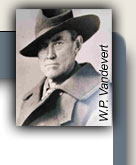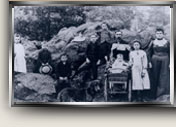|
From the Oregon Journal November 22-23,
1922 (This article is in the public domain)
Bill Vandevert
Bear Hunter
Bend, Oregon
People up Bend way that Bill
Vandevert knows every bear within 100 miles of Bend by its first name and that
he also knows its home address. He is a native son of Oregon, having been born
in Lane, County, not far from Cottage Grove, April 22, 1854. His father,
Jackson J. Vandevert, was born in Ohio, of Hollandish ancestry, and came to
Oregon in 1848.
“My father was born in 1822 – just
100 years ago. He was 25 years old when he started for Oregon, in the Spring of
1848. He was in the wagon train with Boliver Walker, W.H. Walker, John Purvine,
Thomas Clark, and other equally well known Oregon Pioneers.
“During the winter of 1848 he
worked for Dr. John McLoughlin in his mill at Oregon City. The next spring,
with Thomas Clark and John Magison, he went to the California gold mines. They
went on horseback, leading packhorses laden with their grub and outfit. They
had good luck in the mines. Thomas Clark and my father decided to invest the
money they had made from their claim in buying blooded stock. At that time most
of the cattle in the Willamette Valley were half-wild, long-horned Spanish
cattle. They figured that by bringing out some blooded bulls they could soon
breed up a better strain of beef and work cattle.
“In the spring of 1850 Thomas
Clark, father’s partner, went east with all the money they had made, while
Father stayed on the mining claim to rock out more gold. Father returned to
Oregon in 1851, settling among old friends on the Santiam River. Clark traveled
throughout the East, buying up good stock to bring to the Willamette Valley. He
bought a number of Morgan mares in Kentucky, and also some blooded mares in
Ohio. By the spring of 1851 he had 65 horses and 63 Durham cattle ready to
drive across the plains. He started for Oregon with his blooded stock and was
accompanied by a number of his relatives.
“Thomas Clark was an Englishman
and had the Englishman’s love of sport. He was a great hunter, both of large
game and of small, and also a lover of hunting dogs. He wanted to bring his
blooded stock to Oregon in good condition, so he drove them only about 12 miles
a day. Usually, Mrs. Clark with her daughter, Grace, who was 19 years old, and
her son, Hutchinson, 17 years old, would drive ahead to select a good camping
place and prepare dinner for the rest of the party.
“One day Clark, while riding ahead
of the cattle, said to Mrs. Clark, “There is a good camping place just ahead. I
have just looked it over. There is good water and plenty of wood. While you
are getting dinner I will go up Raft River and shoot a few ducks. He took his
shotgun and his dogs and rode on. The others drove up to the trees on the bank
of the river and started to prepare the meal. Soon Sperry and Hoffman came up
with the horses. This camp was on Raft River, about 40 miles west of Fort Hall.
“They had heard that the Shoshone
and Bannock Indians were stealing stock from the emigrants, so when Mrs. Clark
looked up and saw a party of Indians coming toward them she suspected trouble.
She told her son and the others to drive the loose horses back to the main wagon
train. Hutchinson Clark was 17 years old. He saw the Indians taking their guns
out of the leather scabbards, so he said, “Now, Mother, I am not going to leave
you and Grace. These Indians means mischief. I am going to stay and protect
you.”
“He climbed upon a wagon wheel to
get his gun, which was in the wagon. Mrs. Clark and Grace were in the wagon.
Sperry and Huffman ran and took shelter in the rocks by the river bank. The
Indians fired and Hutchinson Clark fell with a bullet through his heart. Mrs.
Clark screamed and the Indians fired at her. Grace threw her arms around her
mother to protect her. The bullet went through her wrist and went on through
her mother’s heart, killing her instantly. Grace started to get out of the
wagon, when one of the Indians fired at her, the bullet entering just below the
armpit and passing entirely through her body. She fell beside her brother. The
Indians tore off her clothes and threw her down over the bluff. She fell on the
sand beside the river. The Indians rolled stones down on her, some of which
struck her, leaving scars on her forehead that remained the rest of her life.
“Thomas Clark, hearing the
shooting, rode at full speed toward the wagon with his hounds, which were baying
loudly. The Indians, seeing him coming, thought he was leading a large number
of whites, so they mounted their horses and fled, driving the blooded Kentucky
horses with them. When the main wagon train came up a party was organized to
pursue and punish the Indians. Charles Clark led the party. They overtook the
Indians, who attacked them, killing one of the white men and wounding another.
The Indians fled, taking the stolen horses with them.
“The wagon train waited there a
day or so for the wounded girl to die, but as she did not die, they started
forward slowly. The train bore southward toward the Three Sisters. They were
the first party to pass over the site of what is now Bend. Thomas Clark named
Pilot Butte. They came pretty well to the foothills of the Cascades and then
swung north, crossing the mountains by the Barlow Trail and coming down into the
Willamette Valley.
“Clark and my father, of course,
lost all the money they had made in the mines when the Indians drove off their
stock. Father, however, found that his partner had brought to Oregon something
infinitely better, for Grace Clark had recovered from her wounds, though it was
not until the spring of 1853 that the patch from the bullet that had gone
through her body worked out, after which the wound in her side healed
completely.
“In 1853 Father took up 320 acres
of land near Cottage Grove. He rode on the foothills trail up the valley, as
the Willamette Valley was under water in places, to get Reverend Robert Robe, a
Presbyterian minister who had come to Oregon in 1846. Father loved hunting and
loved dogs. While going to summon the minister to marry him he ran across two
fine hound puppies, so he slipped one into each coat pocket and brought them
along. I still hunt bears with the descendants of those puppies.
“Father married Grace Clark in
1853. I was their first child, born in the spring of 1854. Four of their seven
children lived to maturity. The other three died of diphtheria. Walter, who
was born in 1855, lives at Redmond. Charley was killed in a runaway. Dick
lives at Oakland, in southern Oregon. Mother died in 1875.
“Clark, after losing his blooded
stock at what is now called Clark’s Grade, went back east the next year to get
more. He came back to Oregon in 1853. While passing through Salt Lake City he
met Brigham Young and purchased from him for $1,600 three blooded mares of
trotting strain. If you will look up the records of the early state fairs in
Oregon you will find Thomas Clark won many a blue ribbon for his blooded horses
and cattle.
“I took to hunting like a duck
takes to water. When I was a youngster deer and elk and bear were plenty. Two
of my mother’s brothers – the Clark boys – were bachelors. They were great
hunters. When I was a boy, ammunition was expensive and hard to come by. They
always saw to it that I was never out of powder or lead. I went to California
with them in 1869. I was only 15. We sure had a wonderful trip. I’ll tell you
about it some day. I will carry the scars I got on that trip to my grave.
“When I was about 19 I carried
mail from Fort Bidwell in California to Camp Warner, in the Klamath country. I
was there while the Modoc War was going on. In 1875, when I was 21, I went to
Humboldt County, California, and the following spring I went to Texas, where I
stayed some years. I lived about midway between Dallas and Fort Worth. On
November 11, 1879, I married a Kentucky girl, Sadie Vinceheller. She was a
teacher.
“A good many years ago, when I was
living near Silver Lake, a fellow rode up to my ranch on a bicycle, Bicycles in
those days were about as plenty as airplanes are now. Everybody would turn out
to see one. This chap asked if he could put up at my place. I made him
welcome. He noticed some hounds lying in the yard and said, “You sure are long
on dogs. What do you do with so many?”
“I said, “Those are bear dogs. I
killed a silver tip a few days ago.” He didn’t think there were any grizzly
bears in Oregon, so I showed him the hide and told him how I ran across the bear
and killed it. First thing I knew he had published two or three columns in a
paper about it. It turned out that the fellow on the bicycle was a newspaper
writer. Some city fellows, seeing the article, wrote to ask me if I would take
them on a bear hunt. So I did, and from that day to this I have been acting as
a guide and bear locator for city hunters.
“I took out E.H. Harriman’s two
sons on a bear hunt. I also went out on a bear hunt with Anna Crocker of San
Francisco. She would take out her cigarette case, hand me a smoke and take one
herself, just as sociable and free and easy as you please.
“I have eight children and I sure
am proud of them. Mittie, my oldest girl, lives in Portland. Bill, my oldest
boy, is running the ranch near Bend. Maud, now Mrs. Catlow, lives in Portland.
She has three children. J.C. and George are doctors, with offices in Bend.
Claude, who served overseas, is on the ranch with Bill. Arthur, my youngest, is
at Louisville, Kentucky, studying to be a doctor. All the rest of our children
graduated at the University of Oregon, so my wife said she wanted one of our
children to get his education in her native state, and that is how it comes that
Arthur is in the Louisville college.
“Come up to Bend some day and I
will take you out with my dogs and we will get a bear, and then you can see how
it comes. I have killed hundreds of bears. There is quite a knack in it.
“No, Sir, I am no spring chicken
any more. I am a five-times grandfather, but I can still tire out most young
fellows who go out in the hills with me. I have done a lot of roaming in my
time, but when a man marries his roaming days are pretty well over. He
exchanges the joys of the long trail for the comfort of the home fireside.”
|






